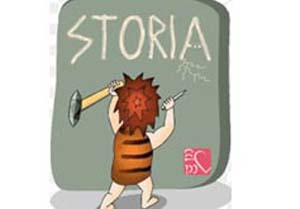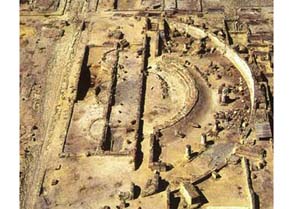 |
|
 |
|
| Visite: 1730 | Gradito: |
Leggi anche appunti:Il mondo divisoIl mondo diviso Parola chiave: Nucleare Le superpotenze: Usa e Urss, ciascuna Diventare cittadini del mondoDIVENTARE CITTADINI DEL MONDO CAP 1 IL CONCETTO DI SVOLTA COMUNICATIVA Il AraldicaARALDICA L'araldica è la scienza del blasone, cioè lo studio degli stemmi |
 |
 |
 Critica
al Marxismo
Critica
al Marxismo
George Orwell
George Orwell was the pen-name of Eric Arthur Blair. Born in 1903 in Bengal, India, he was sent to school in England at the age of eight. He had to study very hard in order to win a scholarship to continue his studies since his parents did not have the necessary money. He was admitted to Eton but he strongly resented its snobbishness; he was treated badly because he was not wealthy. After Eton he refused to go to either Oxford or Cambridge and decided to enroll instead in the Indian Imperial Police in Burma, where he served from 1927 to 1930. He returned to Europe with a keen sense of guilt in relation to the working classes, which he never lost. Later Orwell struggled to win a name for himself as a writer, also teaching in private schools and working in bookshops. In 1936, at the height of the Great Depression, he was commissioned to travel to the north of England to write about social conditions there. Like many left-wing writers of the 1930s, Orwell felt it a moral duty to fight on the republican side in the Spanish civil war. He saw the manipulation of socialist enthusiasts who had flocked there from all over Europe. During World War II Orwell was rejected for the army as unfit on medical grounds; he then went to work for the BBC Indian Service. Orwell remained an essentially left-wing political writer throughout his life, his disillusionment with the totalitarian methods of world Communism was growing. It finally came to the surface in his political fable Animal Farm, a satire of the Russian Revolution which remains one of his most popular works. Orwell died in 1950, a few weeks after the publication of his masterpiece. Nineteen Eighty-Four (1984), anti-utopian novel.
Animal Farm [1945]
It is a political fable describing how the animals on a farm rebel against their cruel master. The animal on the farm are an obvious metaphor for the workers in modern society: like them, they are exploited. The sad conclusion is that the animals/workers lack social consciousness, cannot work for their own good, and that revolutions are doomed to fail and result in new forms of oppression.
More specifically, Animal Farm satirizes the corruption of Socialism in the Soviet Union.
The novel show the importance and, at the same time, the failure of political ideas.
The animal of an old British farm are tired of being exploited by the farmer, Mr. Jones. One of the animals, an old pig called Old Major, convinces the others that they should rebel against man and set up an independent community: Animal Farm, only run by animals. The animals' revolution takes place, led by two disciples of Old Major: two pigs called Napoleon and Snowball. An equalitarian or socialist community is established in the place of the old farm, and all the animals are asked to work for and contribute to the common wealth. The Farm's statutes are drawn up, in the form of seven commandments; the most important is the seventh: "All the animals are equal". This proves not true because Napoleon gradually concentrates all the power in his hands and grants privileges to his fellow pigs: he create a police force to discourage opposition to his rule.
A new form of oppression begins: the pigs have taken the place of the men. At the end of the novel the other animals see pigs and men drinking together to celebrate their pacification and common rule over the farm. A strange thing has happened: to the other animals looking at the scene, the faces of the pigs and the faces of the men seem more and more similar, till they can no longer be distinguished.
Nineteen Eighty-Four [1949]
This, Orwell's most famous work, is an anti-utopian or "dystopian" novel. It describes a dismal society where man's instincts and intelligence are crushed by a ruthless, all-powerful party. The story is set in 1984, not too distant from the time the novel was written: 1948 - the last two numbers of that year were reserved to give the title of the novel.
1984 has become one of the modern myths, or rather anti-myths, with its ruthless and prophetic picture of a world where individuality is annihilated. Big Brother has become the symbol of the total control of the individual's life by mass media in highly technological societies.
In 1984 the world is divided into three great powers: Oceania, Estasia, and Eurasia. They are continually at war with each other. Britain, which is a part of Oceania is ruled by a totalitarian dictatorship whose leader is Big Brother. Big Brother watches every street and building of Britain from huge posters. Everyone is constantly observed by microphones and videocameras. There is no privacy and children are encouraged to denounce their own families. Society id divided between members of the Party, a small minority which has absolute control of everything, and the "proles" (proletarians) who live in separate districts and lead a brutish instinctual life.
Italo Svevo
 Negli anni novanta il socialismo esercitò un
certo fascino su Svevo, che si dichiarerà socialista convinto solo dopo il matrimonio.
E' tuttavia difficile stabilire quanto le letture socialiste e soprattutto la
collaborazione con 'Critica sociale', la rivista di
Turati dove nel 1897 pubblicò La
tribù, abbiano influito sulla sua formazione letteraria.
Negli anni novanta il socialismo esercitò un
certo fascino su Svevo, che si dichiarerà socialista convinto solo dopo il matrimonio.
E' tuttavia difficile stabilire quanto le letture socialiste e soprattutto la
collaborazione con 'Critica sociale', la rivista di
Turati dove nel 1897 pubblicò La
tribù, abbiano influito sulla sua formazione letteraria.
La tribù
Da questo racconto si può notare la critica di Svevo al socialismo, che considera una vera utopia.
Narra di una tribù di nomadi che si ferma in un luogo ricco d'acqua e vegetazione e incomincia a coltivare e costruire. Pian piano però, gli abitanti della tribù si ritrovano ad affrontare i problemi della proprietà privata e litigano tra loro e così viene inviato in Occidente il più giovane di loro, Achmed, per studiare l'organizzazione di quei popoli che hanno sperimentato il socialismo.
Tornato dall'Occidente, Achmed trova la tribù completamente trasformata perché gli abitanti hanno fatto delle leggi a loro modo e hanno lottato per dividere la proprietà. Achmed trova anche che è stata presa la sua proprietà e la reclama con gli interessi. A questo punto, il vecchio capo del villaggio gli promette che gli sarà restituita la proprietà se gli avesse parlato di un popolo dell'occidente che con il socialismo avesse ottenuto la felicità. Achmed dirà che ancora gli occidentali non hanno ottenuto la felicità, ma attraverso la lotta di classe, ciò potrà avverarsi. La tribù restituisce ad Achmed la proprietà con gli interessi e questi costruirà una fabbrica di tipo occidentale, ma poi verrà cacciato, perché gli uomini rifiutano il socialismo e vogliono cominciare "dalla fine" vivendo alla loro maniera, lontani dall'organizzazione del mondo occidentale.
 |
| Appunti su: |
|
| Appunti Archeologia |  |
| Tesine Architettura |  |
| Lezioni Astronomia cosmologia |  |